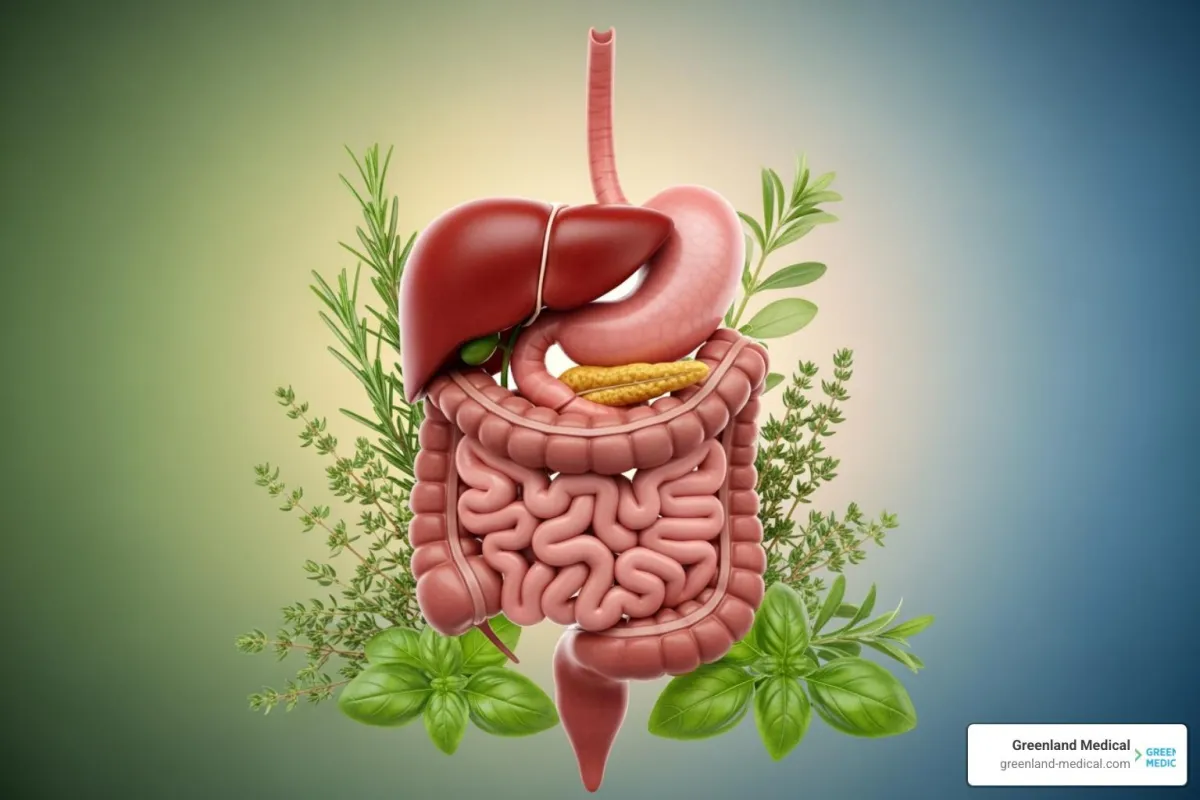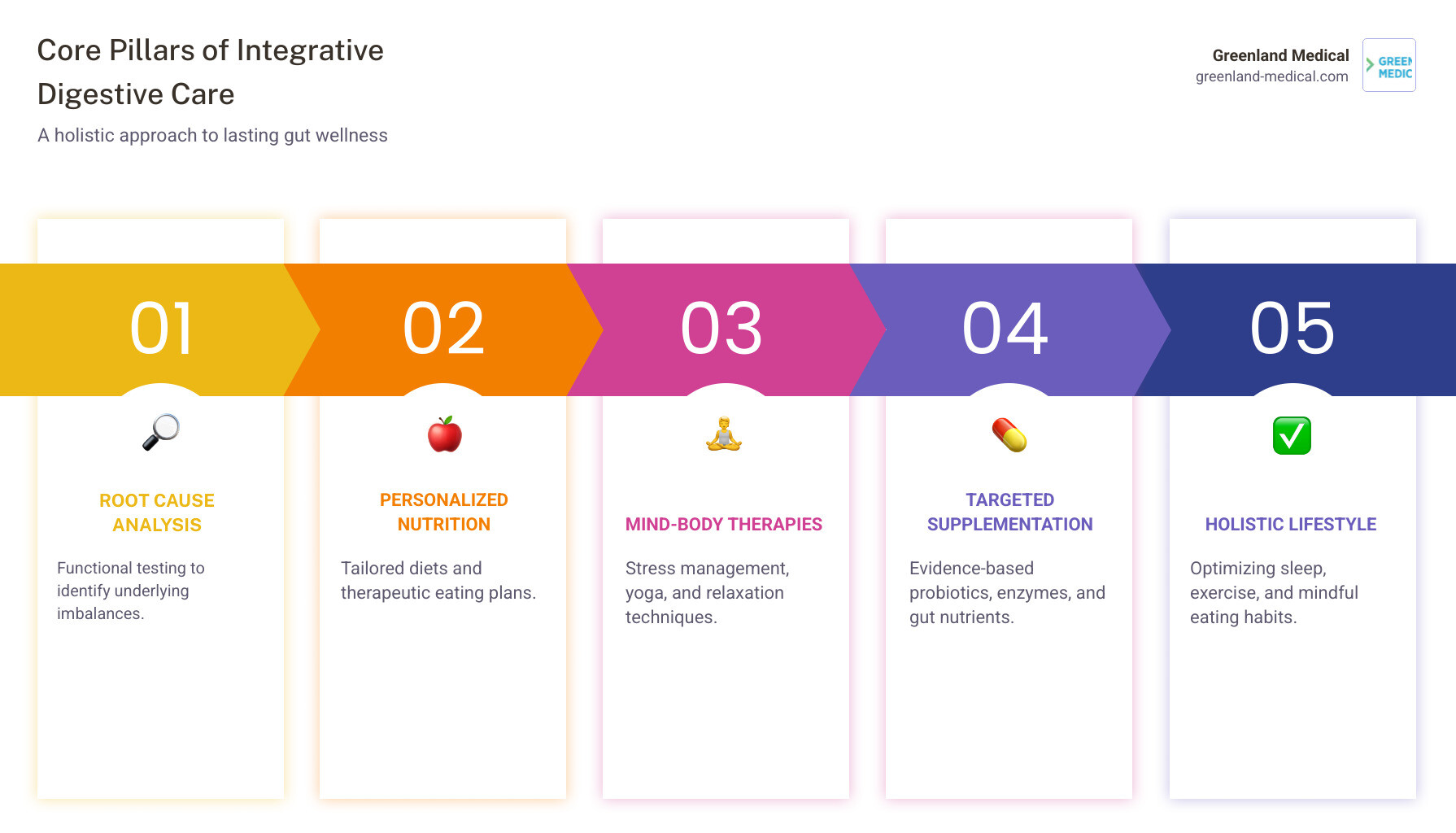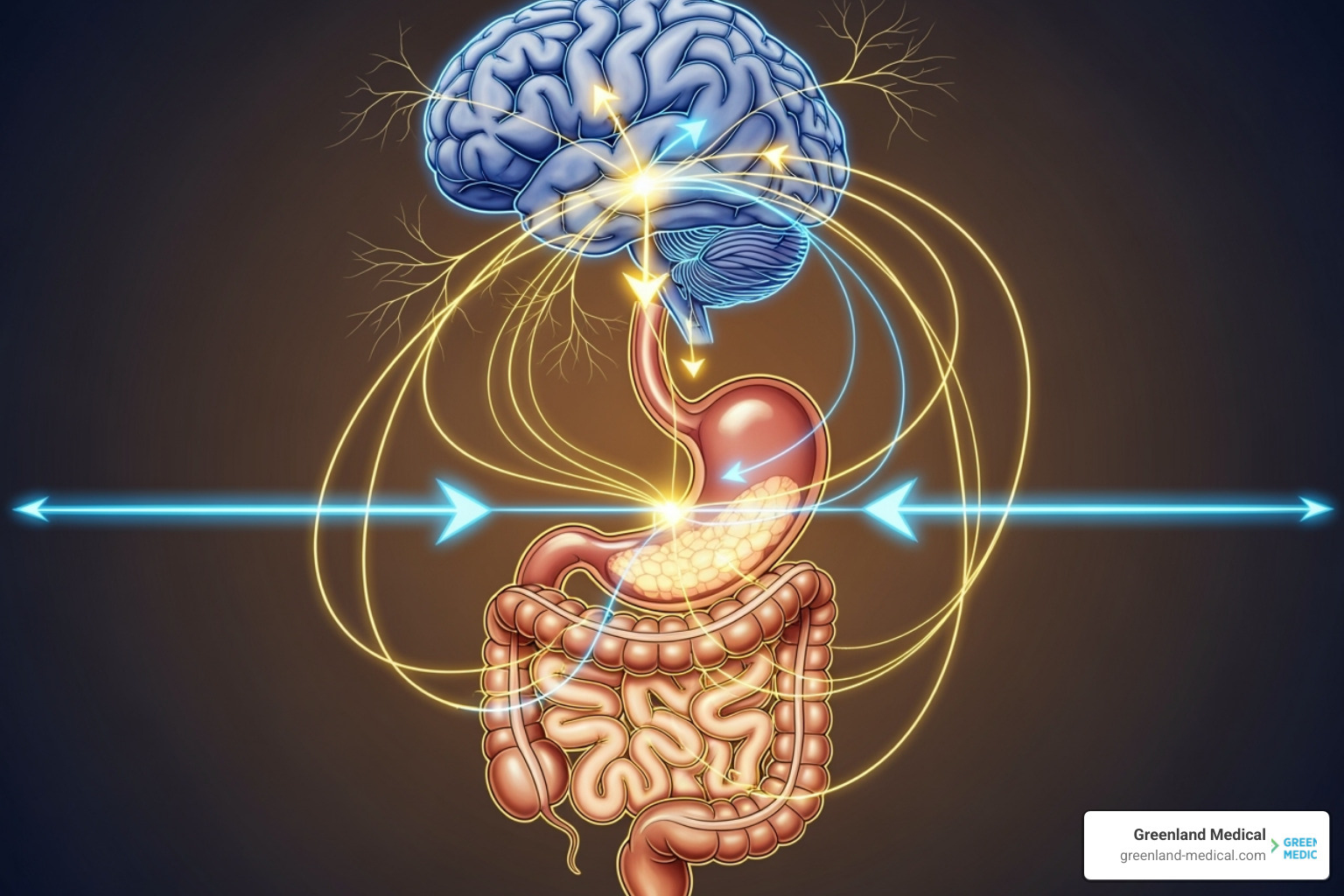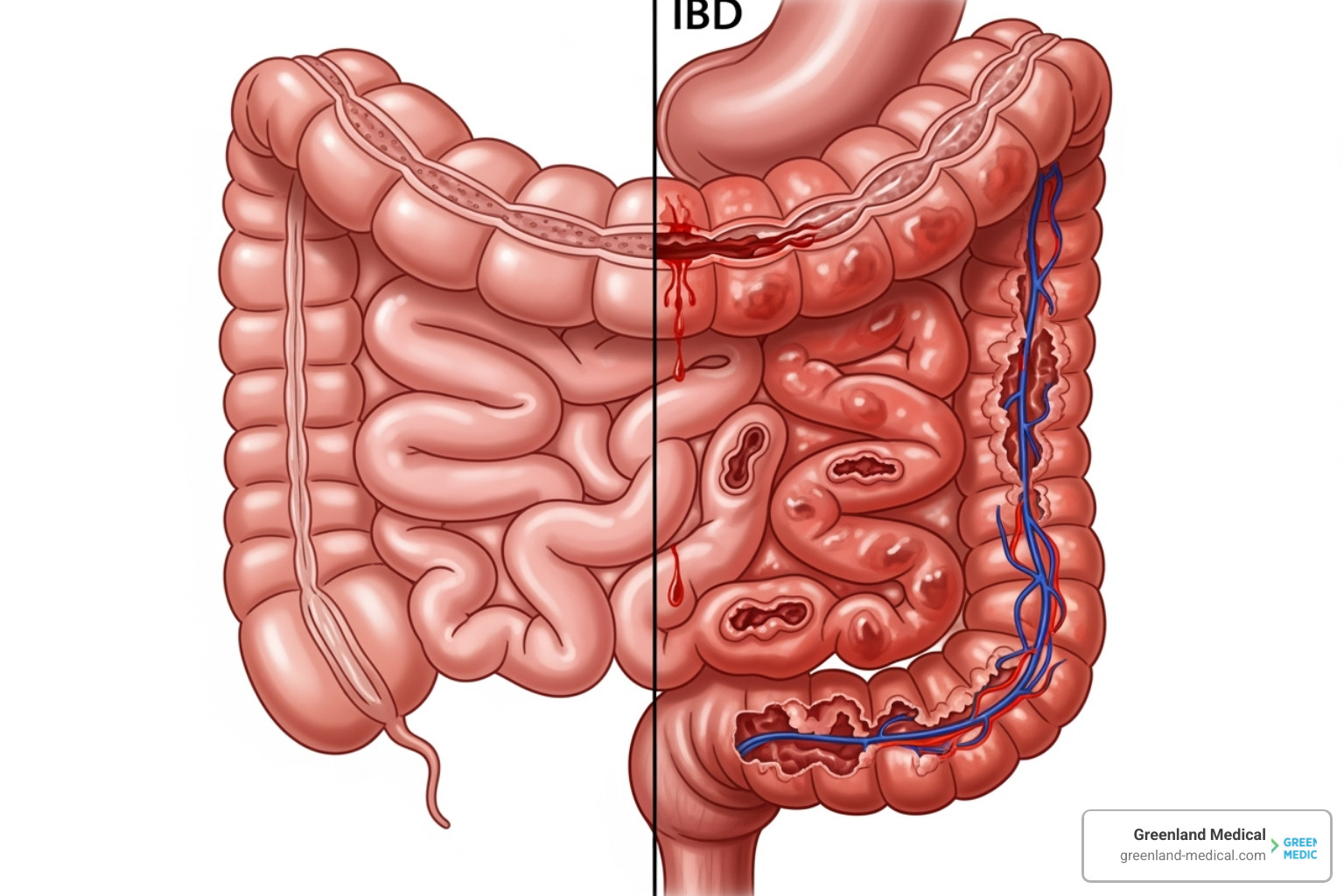
Beyond Conventional: The Power of Integrative Digestive Care
Why Integrative Medicine Digestive Health is Changing Patient Care
Integrative medicine digestive health combines conventional medical care with evidence-based natural therapies to address the root causes of digestive disorders. Instead of just managing symptoms, this approach uses functional testing, personalized nutrition, mind-body therapies, and lifestyle changes to restore balance to your entire digestive system.
Your gut's influence is vast—it houses nearly 70% of your immune system and produces 95% of your body's serotonin. Yet, many with conditions like GERD, IBS, and IBD remain frustrated with standard care that focuses on symptom suppression. Integrative medicine asks a different question: "Why is this happening, and how can we restore normal function?"
As Hippocrates said, "All disease begins in the gut." Modern science confirms this, highlighting the gut-brain axis, where stress can disrupt digestion and poor gut health can trigger mood issues. This connection is central to finding lasting relief.
I'm Dr Andrew Greenland, a dual-trained medical doctor and Certified Functional Medicine Practitioner. At Greenland Medical, I specialize in integrative medicine digestive health, helping patients find lasting solutions by addressing the interconnected factors that drive digestive dysfunction.

The Brain-Gut Axis: Why Your Feelings Affect Your Stomach

Ever notice how stress can upset your stomach? You're experiencing the brain-gut axis—a two-way communication highway connecting your mind and digestive system. Your gut contains the enteric nervous system, often called the "second brain," with over 100 million nerve cells. This system constantly communicates with your main brain via the vagus nerve.
This explains why integrative medicine digestive health approaches focus on treating both mind and gut. When you're anxious, your brain sends distress signals to your gut; when your gut is upset, it sends signals back, affecting your mood.
How Stress and the Microbiome Impact Digestion
Chronic stress triggers your fight-or-flight response, diverting resources away from digestion. This can alter gut motility, causing either diarrhea or constipation. It also increases visceral hypersensitivity, making normal digestive sensations feel painful. Stress can even change digestive secretions and trigger gut inflammation, leading to "leaky gut," where toxins enter the bloodstream and cause systemic issues. This creates a negative feedback loop: gut problems increase anxiety, which in turn worsens gut health.
Your gut microbiome—the trillions of bacteria in your intestines—is a key player. These microbes produce vital chemicals, including 90% of your body's serotonin. An imbalance, known as gut dysbiosis, can disrupt the production of neurotransmitters like GABA and dopamine, affecting your mood and brain function. A healthy microbiome is also essential for immune system regulation, as about 70% of your immune system resides in your gut. The evidence on the gut-brain-immune connection shows these systems are an integrated network. Restoring balance across this network is the goal of integrative care.
Integrative Approaches for Common Digestive Ailments
Digestive problems like gastroesophageal reflux disease (GERD), irritable bowel syndrome (IBS), and inflammatory bowel disease (IBD) are incredibly common. While conventional medicine often manages symptoms with medication, integrative medicine digestive health seeks to uncover and address the root causes driving your discomfort.
Soothing GERD (Acid Reflux) Naturally
GERD occurs when stomach acid flows back into the esophagus. An integrative approach asks why the lower esophageal sphincter (LES) isn't working correctly. We investigate dietary triggers, which can include common culprits like spicy foods but also hidden food sensitivities. Mind-body techniques like diaphragmatic breathing can significantly reduce symptoms by calming the stress response that disrupts digestion. Gentle herbal remedies like deglycyrrhizinated licorice (DGL) and marshmallow root can soothe and protect the esophageal lining.
Managing IBD (Crohn's and Ulcerative Colitis)

IBD, including Crohn's disease and ulcerative colitis, involves chronic inflammation driven by a mix of genetics, environmental factors, and gut microbiome disruptions. Our integrative approach focuses on reducing this inflammation.
Dietary strategies are key. Reducing processed foods and refined sugars is a starting point. Specific approaches like exclusive enteral nutrition or a low-FODMAP diet can be effective for inducing remission or managing symptoms.
Anti-inflammatory supplements provide powerful support. Curcumin (from turmeric) and omega-3 fatty acids help modulate the body's inflammatory response.
Herbal medicines like Plantago ovata seeds and Artemisia absinthium (wormwood) have shown promise in research for maintaining remission, but require professional guidance.
The Role of Integrative Medicine Digestive Health in Calming IBS
IBS is a functional disorder characterized by abdominal pain, bloating, and altered bowel habits, often with "normal" conventional test results. It's a clear sign of a functional imbalance, frequently involving visceral hypersensitivity, where gut nerves are overly reactive.
The low-FODMAP diet is a diagnostic tool that helps up to 86% of patients identify their specific carbohydrate triggers. Strain-specific probiotics can also rebalance the gut microbiome and improve symptoms. One of the most well-researched remedies is enteric-coated peppermint oil, which has an impressive number needed to treat of 2.5 for preventing persistent symptoms. Given the strong brain-gut link, mind-body therapies like gut-directed hypnotherapy are also incredibly effective for resetting the body's stress response and calming symptoms.
The Pillars of an Integrative Diet and Supplement Plan
At Greenland Medical, we believe food is medicine. This philosophy is the foundation of our integrative medicine digestive health approach. Personalized nutrition is key, as what helps one person may trigger another. The goal is to reduce inflammation, optimize nutrient absorption, and create an environment where a healthy gut microbiome can flourish.
Therapeutic Diets for Digestive Relief
Therapeutic diets are powerful tools for identifying triggers and promoting healing.
The Low-FODMAP diet is a short-term elimination and reintroduction process to pinpoint which fermentable carbs cause symptoms like gas and bloating.
A gluten-free diet can benefit not only those with celiac disease but also individuals with non-celiac gluten sensitivity, which can cause IBS-like symptoms.
Elimination diets systematically remove common triggers like dairy, soy, and corn to identify specific food sensitivities.
An anti-inflammatory diet, rich in colorful produce, lean proteins, and healthy fats, helps calm systemic inflammation that contributes to conditions like IBD.
Key Supplements for Gut Support
While diet is primary, targeted supplements provide extra support for healing and optimal function.
Probiotics and prebiotics work together to restore a healthy balance of gut bacteria.
Digestive enzymes help break down food more completely, improving nutrient absorption.
L-Glutamine is an amino acid that helps repair the gut lining, reducing intestinal permeability (leaky gut).
Ginger is a classic remedy for calming nausea and improving digestion.
Peppermint oil (enteric-coated) acts as a natural antispasmodic to relieve IBS-related cramping.
DGL (Deglycyrrhizinated Licorice), slippery elm, and marshmallow root provide a soothing, protective coating for irritated digestive tissues.
Curcumin (from turmeric) is a potent natural anti-inflammatory agent beneficial for overall gut health.
A Deep Dive into Integrative Medicine Digestive Health Therapies

Integrative medicine digestive health uses a broad range of therapies that honor the deep connection between mind, body, and spirit. Addressing health from this perspective often leads to improvements far beyond the gut.
Mind-Body Therapies: Calming the Gut from the Inside Out
Your digestive system is directly influenced by your thoughts and emotions. Mind-body therapies teach you to use this connection for healing.
Meditation and mindfulness train your nervous system to shift out of a chronic "fight or flight" state, which calms the gut and can reduce pain perception.
Yoga combines gentle physical movement to improve gut motility with deep breathing that activates the vagus nerve, promoting a "rest and digest" state.
Gut-directed hypnotherapy is a powerful technique, especially for IBS, that helps you gain conscious control over gut sensations and functions, offering significant and lasting relief.
Cognitive Behavioral Therapy (CBT) helps you identify and change negative thought patterns that can amplify digestive symptoms.
Acupuncture and Herbal Medicine: Ancient Wisdom for Modern Problems
Traditional healing systems offer valuable perspectives that complement modern digestive care.
Acupuncture uses thin needles at specific points to restore balance. For digestive issues, it can help regulate gut motility, reduce pain, and calm inflammation. It is particularly effective for nausea, and you can self-administer acupressure on the P6 (Nei Guan) point on your wrist for relief.
Herbal medicine provides a natural pharmacy to support digestive function. We've already mentioned powerhouses like ginger, peppermint oil, and curcumin. Other herbs like slippery elm and marshmallow root act as demulcents, creating a soothing coating for irritated tissues, while milk thistle supports liver health. These are powerful tools that require professional guidance to ensure safety and effectiveness, which is a cornerstone of our practice at Greenland Medical.
Finding the Root Cause: Functional Testing and Holistic Lifestyle
To achieve lasting wellness, we must look below the surface of symptoms. Our integrative medicine digestive health approach at Greenland Medical focuses on asking "why" your body is creating these symptoms. This shift from symptom management to root cause resolution is transformative.
Functional Testing: An Integrative Medicine Digestive Health Perspective
While conventional tests look for disease, functional testing provides a window into how your digestive system is actually working.
Comprehensive stool analysis reveals the health of your microbiome, checks for pathogens, and measures inflammation and digestion markers.
SIBO breath testing can diagnose Small Intestinal Bacterial Overgrowth, a common underlying cause of IBS-like symptoms.
Food sensitivity testing (IgG/IgA) helps identify delayed immune reactions to foods that can drive inflammation and symptoms.
The organic acids test (OAT) provides a broad metabolic snapshot, revealing yeast overgrowth or nutrient deficiencies impacting gut health.
These tests help us understand issues like intestinal permeability ("leaky gut"), where a compromised gut barrier allows toxins into the bloodstream, triggering widespread inflammation.
Building a Foundation for Lasting Digestive Health

Once we understand the root cause, we build lifestyle habits for lasting wellness. These pillars work together to create an environment for healing.
Quality Sleep: Aim for 7-9 hours per night. Deep sleep is when your body performs essential gut repair.
Regular Movement: A daily 30-minute walk can improve gut motility. Exercise promotes beneficial gut bacteria that help heal the intestinal lining.
Stress Management: Simple deep breathing exercises before meals can switch your body into "rest and digest" mode, significantly improving digestion.
Proper Hydration: Water is essential for digestive juices, waste elimination, and detoxification.
Mindful Eating: Chewing thoroughly and eating without distractions improves nutrient absorption and helps you recognize fullness cues.
Frequently Asked Questions about Integrative Digestive Health
What is the difference between integrative and conventional gastroenterology?
Conventional gastroenterology excels at diagnosing specific diseases and managing them with medication or procedures. Integrative medicine digestive health complements this by asking why the problem exists. We use a wider lens, examining diet, stress, sleep, and environmental factors. The approach is a partnership, combining conventional diagnostics with functional testing to uncover hidden imbalances. Our toolkit is broader, using personalized nutrition, targeted supplements, and mind-body therapies to restore optimal function, not just suppress symptoms. You can learn more about our Functional Medicine and Naturopathy services.
Is a low-FODMAP diet a permanent solution for IBS?
No, a low-FODMAP diet is not meant to be a permanent solution. It's a temporary diagnostic tool used in three phases:
Elimination: A 2-6 week period of avoiding high-FODMAP foods to calm symptoms.
Reintroduction: Systematically reintroducing FODMAP groups to identify your specific triggers.
Personalization: Creating a long-term, varied diet that you can tolerate while managing symptoms. The goal is always to expand your diet as much as possible to support a diverse gut microbiome.
Are probiotics safe for everyone with digestive issues?
For most people, probiotics are very safe and beneficial for conditions like IBS and IBD. However, there are two key considerations. First, individuals who are severely immunocompromised (e.g., undergoing chemotherapy) should consult their doctor before starting, as there is a very small theoretical risk. Second, not all probiotics are the same. Their effects are highly strain-specific. The right strain for your friend's issue may not work for you. This is why professional guidance, based on your unique symptoms and test results, is crucial for choosing an effective probiotic as part of an integrative medicine digestive health plan.
Conclusion: Take Control of Your Digestive Destiny
Your digestive health is the foundation of your entire well-being, influencing your immune system, mood, and energy levels. As we've explored, the brain-gut connection means that stress and emotions directly impact your gut, while your microbiome plays a crucial role in how you feel.
The power of integrative medicine digestive health is its comprehensive approach. Instead of just masking symptoms, we address the why behind your digestive issues, whether it's GERD, IBS, or IBD.
At Greenland Medical, we use advanced functional testing, personalized nutrition, and targeted mind-body therapies to restore your body's natural balance. You now have the tools to make a difference—from stress management and therapeutic diets to building a foundation of quality sleep and regular movement.
Don't let digestive discomfort dictate your life. The power to transform your health is within your reach. If you're ready to move beyond temporary fixes and find the root causes of your challenges, we're here to guide you.
Find our approach to gut health and take the first step toward reclaiming your digestive destiny.
